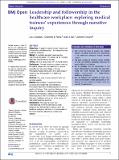Leadership and followership in the healthcare workplace: exploring medical trainees' experiences through narrative inquiry
Abstract
OBJECTIVES: To explore medical trainees' experiences of leadership and followership in the interprofessional healthcare workplace. DESIGN: A qualitative approach using narrative interviewing techniques in 11 group and 19 individual interviews with UK medical trainees. SETTING: Multisite study across four UK health boards. PARTICIPANTS: Through maximum variation sampling, 65 medical trainees were recruited from a range of specialties and at various stages of training. Participants shared stories about their experiences of leadership and followership in the healthcare workplace. METHODS: Data were analysed using thematic and narrative analysis. RESULTS: We identified 171 personal incident narratives about leadership and followership. Participants most often narrated experiences from the position of follower. Their narratives illustrated many factors that facilitate or inhibit developing leadership identities; that traditional medical and interprofessional hierarchies persist within the healthcare workplace; and that wider healthcare systems can act as barriers to distributed leadership practices. CONCLUSIONS: This paper provides new understandings of the multiple ways in which leadership and followership is experienced in the healthcare workplace and sets out recommendations for future leadership educational practices and research.
Citation
Gordon , L J , Rees , C E , Ker , J S & Cleland , J 2015 , ' Leadership and followership in the healthcare workplace: exploring medical trainees' experiences through narrative inquiry ' , BMJ Open , vol. 5 , no. 12 , e008898 . https://doi.org/10.1136/bmjopen-2015-008898
Publication
BMJ Open
Status
Peer reviewed
ISSN
2044-6055Type
Journal article
Description
This research was part of LJG’s PhD research which was generously funded by NHS Education for Scotland through SMERC.Collections
Items in the St Andrews Research Repository are protected by copyright, with all rights reserved, unless otherwise indicated.

